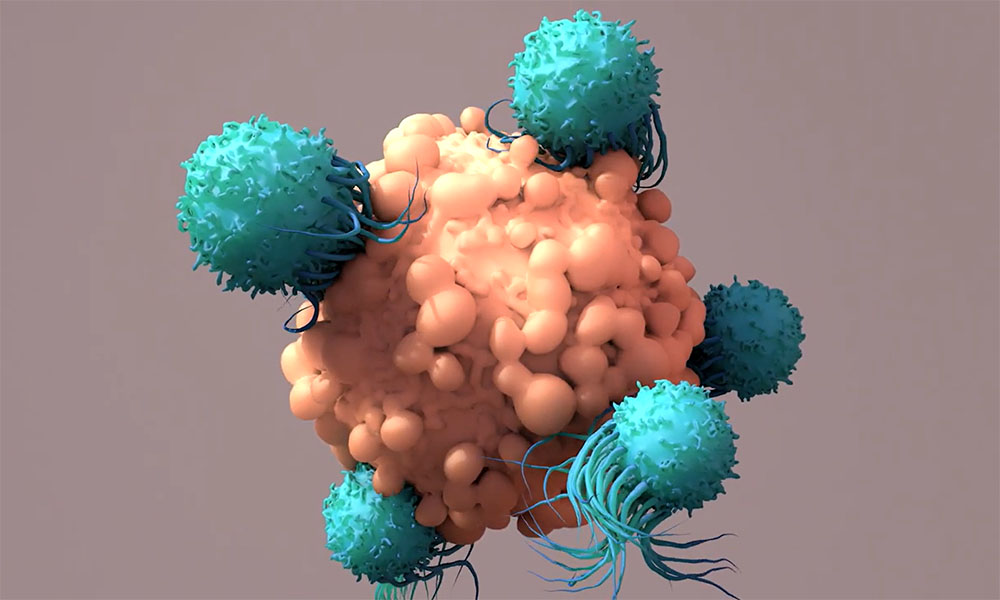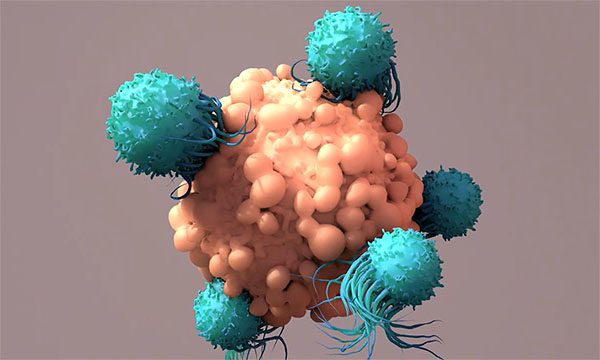Targeted Therapy vs. Immunotherapy for Cancer
Learn more about immunotherapy and targeted therapy, advanced treatments for cancer that work in different ways.
Mass General Brigham Cancer Institute
Contact
In CAR T-cell cancer treatment, your blood is collected through a process called apheresis, sometimes called leukapheresis. This process separates your T-cells from the rest of your blood. The T-cells are then sent to a lab where they are engineered to attack B-cell lymphoma cells. The engineered T-cells are then multiplied and sent back to the hospital. Back in the hospital, the cells are reintroduced to your body through an IV infusion.
CAR T-cell therapy is a complex treatment that can cause severe side effects. Because of this, it is only given during a stay in the hospital. You will be carefully monitored by your treatment team for any side effects of CAR T-cell therapy. You will also be told about side effects and how to best care for yourself after you leave the hospital.
In CAR T-cell cancer treatment, a patient's own cells are modified in the lab to attack cancer cells in the blood. Once blood is removed from a patient, T-cells gain a special chimeric antigen receptor (CAR), which can bind to a protein on the cancer cells. Multiplied in the lab, the CAR T-cells are then reintroduced to the patient via blood infusion to attack cancerous cells.
Mass General Brigham Cancer Institute is an authorized treatment center for FDA approved CAR T-cell therapies for adult patients with lymphoma (Breyanzi, Kymriah, Tecartus and Yescarta) and for adult patients with multiple myeloma (Abecma).
CAR T-cell therapy for lymphoma offers a treatment option for some patients with non-Hodgkin lymphoma that has not responded to other therapies. CAR T-cell therapy has a targeted purpose and is designed for specific lymphoma, including large B-cell lymphoma, high-grade B-cell lymphoma, mediastinal large B-cell lymphoma, follicular lymphoma and mantle cell lymphoma. CAR T-cell treatment options for lymphoma include:
Breyanzi is FDA approved for the treatment of adult patients with relapsed or refractory large B-cell lymphoma after two or more lines of systemic therapy, including diffuse large B-cell lymphoma (DLBCL) not otherwise specified (including DLBCL arising from indolent lymphoma), high-grade B-cell lymphoma, primary mediastinal large B-cell lymphoma, and follicular lymphoma grade 3B.
Kymriah is FDA approved for adult patients with relapsed or refractory large B-cell lymphoma after two or more lines of systemic therapy including diffuse large B-cell lymphoma (DLBCL) not otherwise specified, high grade B-cell lymphoma and DLBCL arising from follicular lymphoma.
Tecartus is FDA approved for the treatment of adult patients with relapsed/refractory mantle cell lymphoma (r/r MCL).
Yescarta is FDA approved for adult patients with relapsed or refractory large B-cell lymphoma (DLBCL), primary mediastinal large B-cell lymphoma (PMBCL), high-grade B-cell lymphoma, and DLBCL arising from follicular lymphoma (transformed follicular lymphoma). Patients must have received two or more other forms of cancer treatment which did not successfully treat their cancer.
Yescarta is also FDA approved for adult patients with relapsed or refractory follicular lymphoma (FL) after two or more lines of systemic therapy.
View Cellular Therapy clinical trials.
View Lymphoma clinical trials.
Learn more about the Cancer Institute's Lymphoma treatment program.
CAR T-cell therapy for multiple myeloma offers treatment for some patients with multiple myeloma that has not responded to other therapies. CAR T-cell multiple myeloma drugs are designed to attack cancer cells. The therapy is designed specifically to treat relapsed or refractory multiple myeloma.
Abecma was approved by the FDA in March 2021 for the treatment of adult patients with relapsed or refractory multiple myeloma after four or more prior lines of therapy including an immunomodulatory agent, a proteasome inhibitor, and an anti-CD38 monoclonal antibody.
View Cellular Therapy clinical trials.
View Multiple Myeloma clinical trials.
Learn more about the Cancer Institute's Multiple Myeloma treatment program.
Find updated information on CAR T-Cell immunotherapy for lymphoma and multiple myeloma. For more details, please refer to our brochure.
T-cells are lymphocytes, which are a type of white blood cell. White blood cells fight infection.
Immunotherapy is a type of cancer treatment that uses the body’s immune system to find and attack cancer cells. CAR T-cell treatment is a type of immunotherapy.
CAR T-cell therapy offers treatment for some patients with non-Hodgkin lymphoma and multiple myeloma that has not responded to other therapies. Each therapy has a targeted purpose and was designed for a specific lymphoma or multiple myeloma.
The FDA approved CAR T-cell therapies offered at Mass General Brigham Cancer Institute include Breyanzi, Kymriah, Tecartus, Yescarta and Abecma. These therapies provide targeted treatment of B-cell lymphoma, high-grade B-cell lymphoma, mediastinal large B-cell lymphoma, follicular lymphoma, mantle cell lymphoma and multiple myeloma.
T-cells are collected from your blood by apheresis, a process that takes blood from the body and removes one or more blood components such as plasma, platelets or white blood cells. The remaining blood is then returned to the body.
An allergic response when the CAR T-cells are being infused into your blood. Your treatment team will monitor your vital signs and labs closely during your CAR T-cell infusion. You will also be given Tylenol and Benadryl before the CAR T-cell infusion to help stop a reaction.
Your hospital stay may range from one week to one month, or potentially longer. The length of stay depends on your body’s reaction to the CAR T-cell infusion and possible side effects.
You will be very carefully monitored after your infusion for any side effects. Report any of these side effects to your treatment team immediately.
Possible side effects include:
If you experience any of these side effects after you leave the hospital, call your treatment team right away:
Family members are often the first to notice changes in behavior such as trouble remembering or confusion. Family members should report these changes to your treatment team.
CAR T-cell therapy has a verifiable track record of improving outcomes for patients when other treatments have not been successful. As treatment therapies improve, expect a continued success rate. Some studies show that up to 50% of patients treated with CAR T-cell therapies have found lasting remission with no additional treatment.
Your treatment team will talk with you about how to care for yourself when you leave the hospital. They will give you specific information about personal care, mouth care, and hand washing. They can answer any other questions that you may have.
For more information about treatment with CAR T-cell immunotherapy for lymphoma, please refer to our brochure.
Learn more about CAR T-cell therapy in this series of videos.
What is CAR T-Cell Therapy? How can we use the immune system to fight cancer? What are the latest advancements in cell therapy? Matthew Frigault, MD discusses how cells in the body can provide long-term protection against different types of cancer.
What is immunotherapy and how is CAR T-cell therapy, a type of immunotherapy, used to treat multiple myeloma? Andrew Yee, MD explains what multiple myeloma is, and why CAR T-cell therapy is becoming a standard treatment for this rare blood cancer.
Gene therapy offers durable treatments that modify defective genetic material to combat disease, while cell therapy involves the transplantation of healthy cells to repair or replace damaged tissue. Together, these therapies aim to restore proper cellular and genetic functions.
Noopur Raje, MD, Marcela Maus, MD, PhD and Matthew Frigault, MD discuss the power and evolution of immune therapies, specifically, CAR T-Cell therapy in treating cancer.
Billy Costa talks with Dr. Matt Frigault and oncology social worker Lauren DeMarco to learn more about the latest in CAR- T-cell therapies and what it all means for patients.
Kiss 108 FM’s Billy Costa talks with four experts from the Cancer Institute to learn about what CAR T-cell therapy is and what impact it has on both patients and the medical community.
Kiss 108 FM’s Billy Costa gets a doctor’s perspective of CAR T-cell therapy with the Cancer Institute's clinical director for the Center of Lymphoma, Dr. Jeremy Abramson.
Kiss 108 FM’s Billy Costa sits down with Dr. Marcela Maus, director of cellular immunotherapy at the Cancer Institute, and discusses what CAR T-cell therapy is, who is eligible for treatments, and the future direction of CAR T-cell therapy.
Kiss 108 FM’s Billy Costa discusses CAR T-cell therapy with Mass General Brigham Cancer Institute’s Dr. Matthew Frigault, medical oncologist and administrative director for Cellular Therapy Services, who explains how this therapy has the potential to impact patients in immense ways.
Natalie Rosenlieb and Adam Caughhorn, both RNs at Mass General Brigham Cancer Institute, sit down with Kiss 108 Radio's Billy Costa to talk about the impact of CAR T-Cell Therapy on their patients.
View our CAR T-cell immunotherapy for lymphoma brochure.
Learn about our lymphoma treatment program.
Learn about our multiple myeloma treatment program.
View Abecma patient education materials.
View Breyanzi patient education materials.
View Kymriah patient education materials.
View Tecartus patient education materials.
View Yescarta patient education materials.
Our support programs can help patients and their families cope with the challenges of a cancer diagnosis.
View inspiring cancer survivor stories from Mass General Brigham Cancer Institute’s community of patients, families, and staff.
Learn more about immunotherapy and targeted therapy, advanced treatments for cancer that work in different ways.
A collaborative project to bring the promise of cell therapy to patients with a deadly form of brain cancer has shown dramatic results among the first patients to receive the novel treatment.
Learn more about the findings and importance of a study led by a research and clinical team from the Mass General Brigham Cancer Institute who is developing new cell therapy for patients with recurrent glioblastoma.
Noopur Raje, MD, Marcela Maus, MD, PhD and Matthew Frigault, MD discuss the power and evolution of immune therapies, specifically, CAR T-Cell therapy in treating cancer.
Billy Costa talks with Dr. Matt Frigault and oncology social worker Lauren DeMarco to learn more about the latest in CAR T-cell therapies and what it all means for patients.
Immunotherapy is a cancer treatment that works by boosting the body’s immune system. Some patients achieve full remission, meaning all signs of their cancer have disappeared.
For more information about CAR T-cell therapies and to arrange a consultation, please contact us.


